SEO
SEO is Turning into a Questions and Answers Game

I hope you enjoy reading this blog post.
If you want my team to just do your marketing for you, click here.

I was reading an article from my buddy the other day and he had an interesting trend.
14.1% of all searches on Google are in the form of a question.
Here’s the breakdown within the United States:
- How – 8.07%
- What – 3.4%
- Where – .88%
- Why – .82%
- Who – .6%
- Which – .33%
Because we have over a billion keywords globally in Ubersuggest and we already have a questions section, I thought it would be fun to see what it would look like worldwide.
As a heads up, it was a bit tricky for certain languages as people don’t always start a question with certain words like “how”.
None-the-less we were able to gather some interesting stats as we have data going back to 2017.
Global question and answer searches
Here’s what the question searches looked like in 2017.

And here’s 2018.

And 2019.

And 2020.

What do you notice when looking at the data?
Generally, the overall percentage of question-based search queries has gone up. In 2017 it was 13.41% and it went up to 14.52% in 2020.
The big change though was “how” related keywords went up consistently each year. From 7.68% in 2017 to 8.61% in 2020.
My guess is because more of the world’s population has been getting access to the Internet due to the mass adaption of mobile devices more of them are interested in learning solutions to their problems. Hence the increase in searches of “how” related terms.
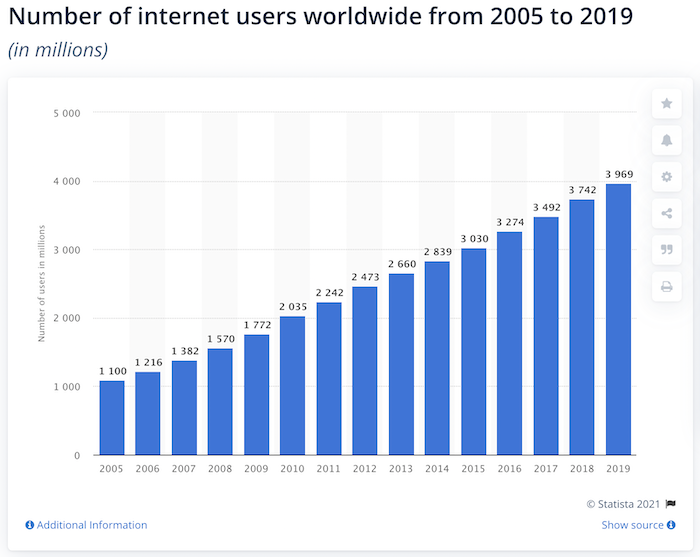
Just look at Neilpatel.com. Here are my ten most popular pages in Brazil from an SEO traffic standpoint.
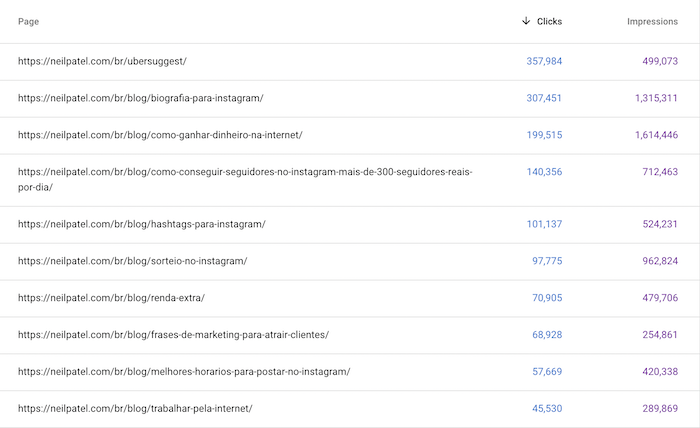
5 of the top 10 pages are question oriented URLs.
And it isn’t just with emerging Internet regions. Look at my US SEO traffic…
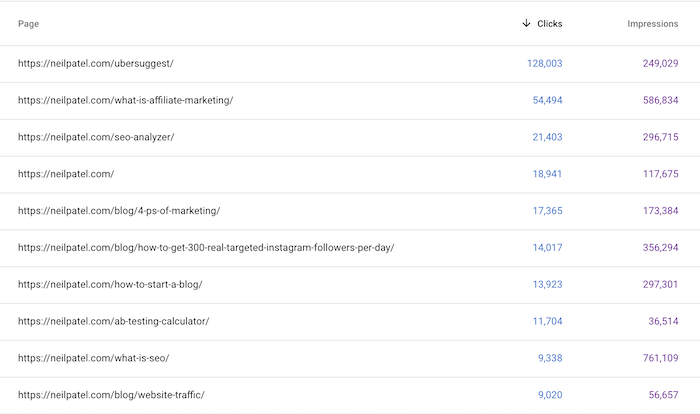
60% of the top 10 pages are question related.
But here’s where it gets interesting…
Questions are easier to rank for
Although questions are making up roughly 14.52% of the searches globally, there is something interesting to note.
They are much easier to rank for.
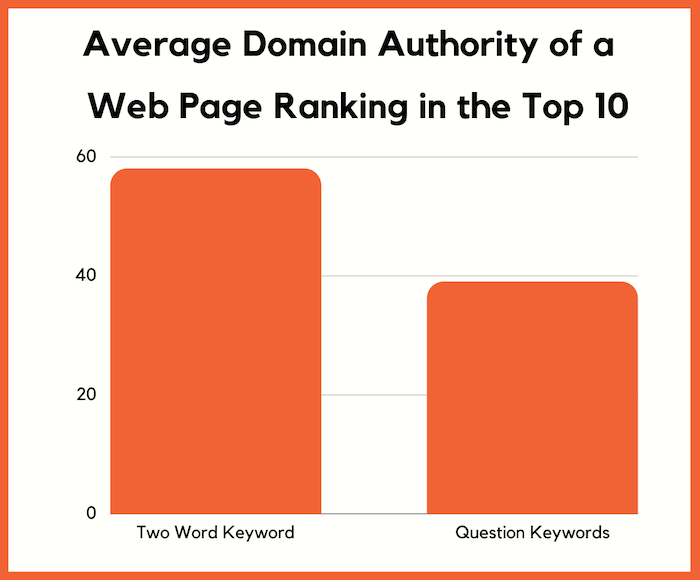
On average you need a domain authority of 58 to rank on the top 10 of Google for a two-word keyword, while you only need a domain authority of 39 to rank for a question-related term.
Now, if that doesn’t convince you to start creating questions related content, this should…
Blogs with 100,000 visitors create question-related content
We did an analysis of blogs that have over 100,000 monthly SEO visitors. When we looked at their top 100 pages, here’s what portion of their traffic came from questions.
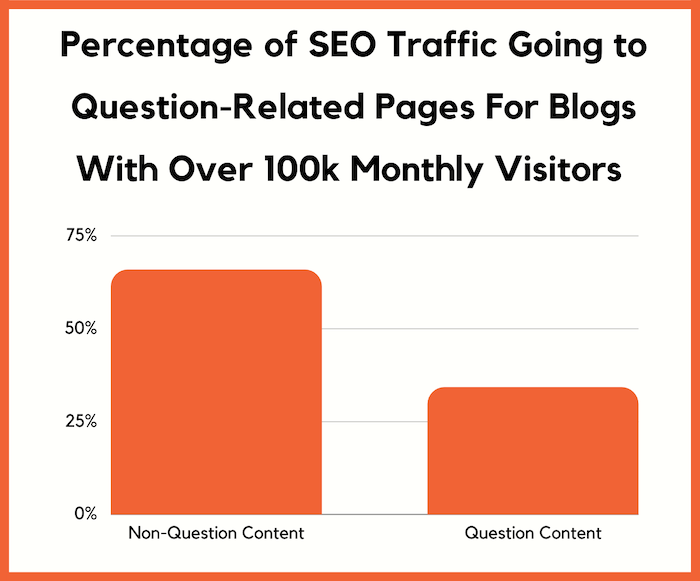
It’s a key ingredient to having a popular blog. Plus you don’t need as many links, hence you don’t need as high as a domain authority to rank.
If you aren’t going after question-related terms, you should consider doing so. And here’s how I would do it if I was you.
Head over to Ubersuggest and type in one of the main keywords related to your site. You don’t have to rank for that term, instead, you are using it for ideas.
For NeilPatel.com one of my main keywords related to my blog is “digital marketing”.
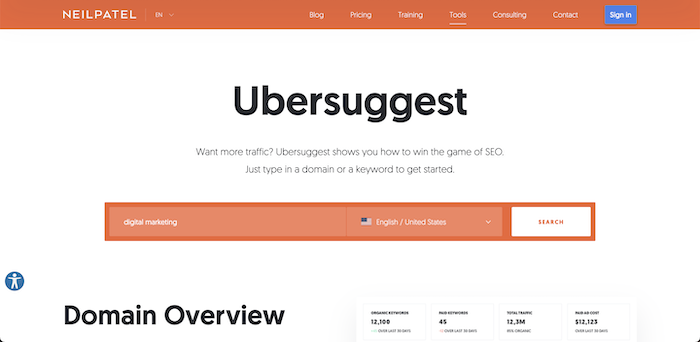
Once you hit “search” you’ll see a page that looks like this:
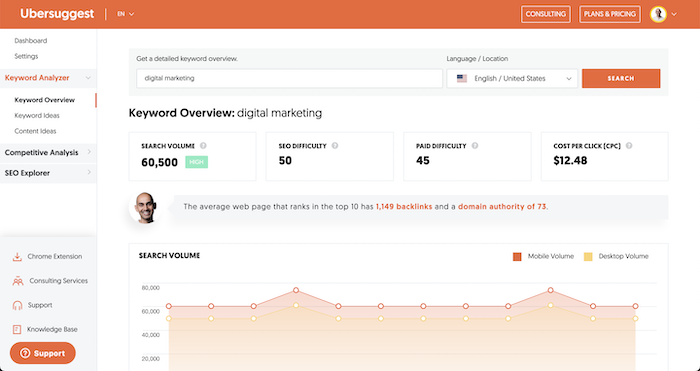
I want you to click on “Keyword Ideas” in the left hand navigation.
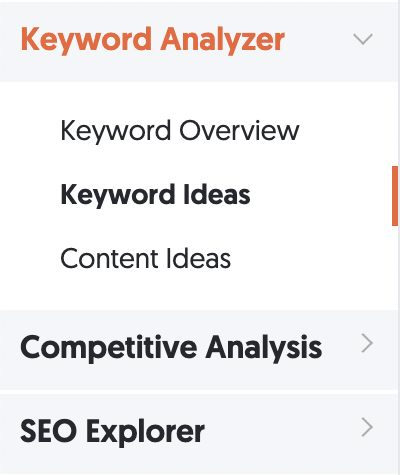
Uberuggest will present you with a list of thousands of potential keyword ideas.
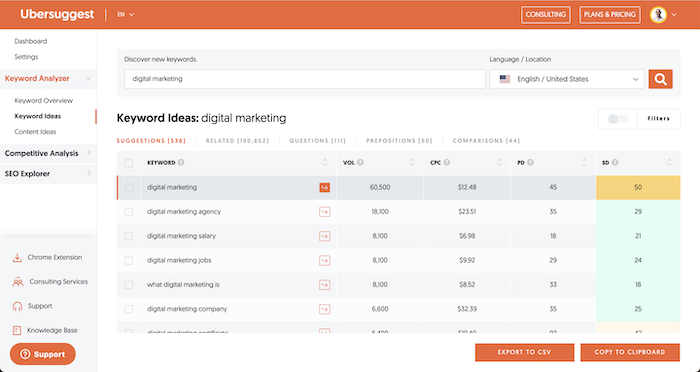
Now click on the “questions” navigational link… it should be right above the list of keyword ideas.

You’ll then be presented with a list of question related keywords that you could target.
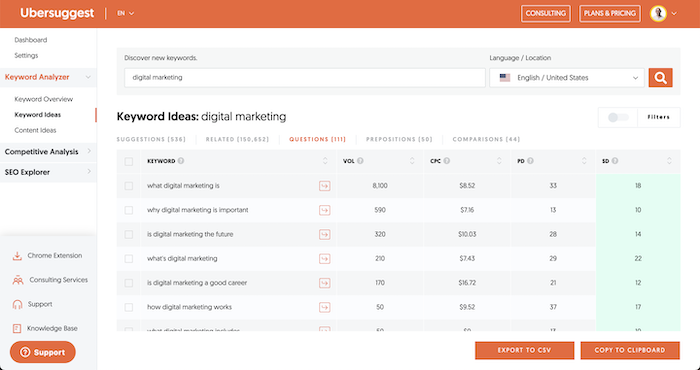
These keywords aren’t as popular as head terms, but there are a lot of them you can create content around. All you need to do is keep putting in more and more keywords within Ubersuggest and look at the “question” related suggestions.
Over time if you create content on hundreds of them, you’ll notice that the traffic will start adding up.
It’s not as competitive, new sites can easily rank for question based content.
Just look at Quora. It’s a site purely around question and answers.

According to Ubersuggest, it gets roughly 141 million visits a month from SEO. That’s a lot of traffic from creating question-related content.
Conclusion
If you haven’t created question related content you should start doing so.
It’s a large portion of my traffic and it is a strategy we use for all of our clients at my ad agency.
The more detailed you get on your content the better off you are going to do.
So, what are you waiting for? Go type in some keywords and start finding some popular question-based content.
See How My Agency Can Drive Massive Amounts of Traffic to Your Website
- SEO – unlock massive amounts of SEO traffic. See real results.
- Content Marketing – our team creates epic content that will get shared, get links, and attract traffic.
- Paid Media – effective paid strategies with clear ROI.
SEO
Google Declares It The “Gemini Era” As Revenue Grows 15%

Alphabet Inc., Google’s parent company, announced its first quarter 2024 financial results today.
While Google reported double-digit growth in key revenue areas, the focus was on its AI developments, dubbed the “Gemini era” by CEO Sundar Pichai.
The Numbers: 15% Revenue Growth, Operating Margins Expand
Alphabet reported Q1 revenues of $80.5 billion, a 15% increase year-over-year, exceeding Wall Street’s projections.
Net income was $23.7 billion, with diluted earnings per share of $1.89. Operating margins expanded to 32%, up from 25% in the prior year.
Ruth Porat, Alphabet’s President and CFO, stated:
“Our strong financial results reflect revenue strength across the company and ongoing efforts to durably reengineer our cost base.”
Google’s core advertising units, such as Search and YouTube, drove growth. Google advertising revenues hit $61.7 billion for the quarter.
The Cloud division also maintained momentum, with revenues of $9.6 billion, up 28% year-over-year.
Pichai highlighted that YouTube and Cloud are expected to exit 2024 at a combined $100 billion annual revenue run rate.
Generative AI Integration in Search
Google experimented with AI-powered features in Search Labs before recently introducing AI overviews into the main search results page.
Regarding the gradual rollout, Pichai states:
“We are being measured in how we do this, focusing on areas where gen AI can improve the Search experience, while also prioritizing traffic to websites and merchants.”
Pichai reports that Google’s generative AI features have answered over a billion queries already:
“We’ve already served billions of queries with our generative AI features. It’s enabling people to access new information, to ask questions in new ways, and to ask more complex questions.”
Google reports increased Search usage and user satisfaction among those interacting with the new AI overview results.
The company also highlighted its “Circle to Search” feature on Android, which allows users to circle objects on their screen or in videos to get instant AI-powered answers via Google Lens.
Reorganizing For The “Gemini Era”
As part of the AI roadmap, Alphabet is consolidating all teams building AI models under the Google DeepMind umbrella.
Pichai revealed that, through hardware and software improvements, the company has reduced machine costs associated with its generative AI search results by 80% over the past year.
He states:
“Our data centers are some of the most high-performing, secure, reliable and efficient in the world. We’ve developed new AI models and algorithms that are more than one hundred times more efficient than they were 18 months ago.
How Will Google Make Money With AI?
Alphabet sees opportunities to monetize AI through its advertising products, Cloud offerings, and subscription services.
Google is integrating Gemini into ad products like Performance Max. The company’s Cloud division is bringing “the best of Google AI” to enterprise customers worldwide.
Google One, the company’s subscription service, surpassed 100 million paid subscribers in Q1 and introduced a new premium plan featuring advanced generative AI capabilities powered by Gemini models.
Future Outlook
Pichai outlined six key advantages positioning Alphabet to lead the “next wave of AI innovation”:
- Research leadership in AI breakthroughs like the multimodal Gemini model
- Robust AI infrastructure and custom TPU chips
- Integrating generative AI into Search to enhance the user experience
- A global product footprint reaching billions
- Streamlined teams and improved execution velocity
- Multiple revenue streams to monetize AI through advertising and cloud
With upcoming events like Google I/O and Google Marketing Live, the company is expected to share further updates on its AI initiatives and product roadmap.
Featured Image: Sergei Elagin/Shutterstock
SEO
brightonSEO Live Blog

Hello everyone. It’s April again, so I’m back in Brighton for another two days of Being the introvert I am, my idea of fun isn’t hanging around our booth all day explaining we’ve run out of t-shirts (seriously, you need to be fast if you want swag!). So I decided to do something useful and live-blog the event instead.
Follow below for talk takeaways and (very) mildly humorous commentary. sun, sea, and SEO!
SEO
Google Further Postpones Third-Party Cookie Deprecation In Chrome

Google has again delayed its plan to phase out third-party cookies in the Chrome web browser. The latest postponement comes after ongoing challenges in reconciling feedback from industry stakeholders and regulators.
The announcement was made in Google and the UK’s Competition and Markets Authority (CMA) joint quarterly report on the Privacy Sandbox initiative, scheduled for release on April 26.
Chrome’s Third-Party Cookie Phaseout Pushed To 2025
Google states it “will not complete third-party cookie deprecation during the second half of Q4” this year as planned.
Instead, the tech giant aims to begin deprecating third-party cookies in Chrome “starting early next year,” assuming an agreement can be reached with the CMA and the UK’s Information Commissioner’s Office (ICO).
The statement reads:
“We recognize that there are ongoing challenges related to reconciling divergent feedback from the industry, regulators and developers, and will continue to engage closely with the entire ecosystem. It’s also critical that the CMA has sufficient time to review all evidence, including results from industry tests, which the CMA has asked market participants to provide by the end of June.”
Continued Engagement With Regulators
Google reiterated its commitment to “engaging closely with the CMA and ICO” throughout the process and hopes to conclude discussions this year.
This marks the third delay to Google’s plan to deprecate third-party cookies, initially aiming for a Q3 2023 phaseout before pushing it back to late 2024.
The postponements reflect the challenges in transitioning away from cross-site user tracking while balancing privacy and advertiser interests.
Transition Period & Impact
In January, Chrome began restricting third-party cookie access for 1% of users globally. This percentage was expected to gradually increase until 100% of users were covered by Q3 2024.
However, the latest delay gives websites and services more time to migrate away from third-party cookie dependencies through Google’s limited “deprecation trials” program.
The trials offer temporary cookie access extensions until December 27, 2024, for non-advertising use cases that can demonstrate direct user impact and functional breakage.
While easing the transition, the trials have strict eligibility rules. Advertising-related services are ineligible, and origins matching known ad-related domains are rejected.
Google states the program aims to address functional issues rather than relieve general data collection inconveniences.
Publisher & Advertiser Implications
The repeated delays highlight the potential disruption for digital publishers and advertisers relying on third-party cookie tracking.
Industry groups have raised concerns that restricting cross-site tracking could push websites toward more opaque privacy-invasive practices.
However, privacy advocates view the phaseout as crucial in preventing covert user profiling across the web.
With the latest postponement, all parties have more time to prepare for the eventual loss of third-party cookies and adopt Google’s proposed Privacy Sandbox APIs as replacements.
Featured Image: Novikov Aleksey/Shutterstock
-

 PPC7 days ago
PPC7 days ago19 Best SEO Tools in 2024 (For Every Use Case)
-
SEARCHENGINES6 days ago
Daily Search Forum Recap: April 19, 2024
-
SEARCHENGINES7 days ago
Daily Search Forum Recap: April 18, 2024
-

 WORDPRESS6 days ago
WORDPRESS6 days agoHow to Make $5000 of Passive Income Every Month in WordPress
-

 SEO7 days ago
SEO7 days ago25 WordPress Alternatives Best For SEO
-

 WORDPRESS5 days ago
WORDPRESS5 days ago13 Best HubSpot Alternatives for 2024 (Free + Paid)
-

 WORDPRESS6 days ago
WORDPRESS6 days ago7 Best WooCommerce Points and Rewards Plugins (Free & Paid)
-

 MARKETING6 days ago
MARKETING6 days agoBattling for Attention in the 2024 Election Year Media Frenzy
















You must be logged in to post a comment Login